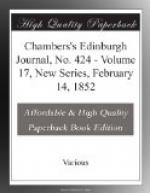The government of Australia has certainly been very successful in preserving order at the gold placers there, and has given its sanction upon moderate terms; for here, we believe, gold and silver mines are inter regalia, and could have been entirely seized by the crown. We sincerely trust it will appropriate the great and unexpected revenue thence arising in improving the roads through this magnificent country, and providing shelter for the traveller; for at this moment, many of the roads being over the steepest mountains, and the gradients unmitigated by cuttings, or any other act of engineering whatever, they are all but impassable, and are travelled with the greatest torture to the unfortunate animals concerned. It was the reproach of Spain, that though in possession of South America for centuries, she had formed few roads; and that the few formed were bad, and the accommodation in their neighbourhood of the worst description—often open sheds, without food or furniture, or indeed inhabitants; or if inhabited, with only stones for seats, and raised mounds of earth for beds. Even now, in little more than half a century, things are better in Australia than this, at least wherever government has extended. But there is a vast deal more to be done; and it is a pity that in the first place suitable schools are not formed for the persons intending to emigrate, and opportunity given them to do so, without the degradation of crime, and the expense and disgrace of conviction.
EMPLOYEES AND EMPLOYED.
The Westminster Review for January, in an able and temperate article, entitled Employers and Employed, delineates the progress of the working power from the original condition of serfdom, through that of vassalage, which prevailed in the middle ages, to the system of simple contract in which we now find it in France and America. This the writer regards as part of a universal progress towards a more and more equalised condition of the various orders of men—’an equality, not perhaps of wealth, or of mind, or of inherent power, but of social condition, and of individual rights and freedom.’ In England, however, we are only in a state of transition from that relation of protection on the one hand, and respect or loyalty on the other, which constituted the system of vassalage, to the true democratic relation which assumes a perfect equality and independence in the contracting parties. ’The master cannot divest himself of the idea, that in virtue of his rank he is entitled to deference and submission; and the workman conceives that, in virtue of his comparative poverty, he is entitled to assistance in difficulty, and to protection from the consequences of his own folly and improvidence. Each party expects from the other something more than is expressed or implied in the covenant between them. The workman, asserting his equality and independence, claims from his employer services which only inferiority can legitimately demand; the master, tacitly and in his heart denying this equality and independence, repudiates claims which only the validity of this plea of equality and independence can effectually nonsuit or liquidate.’




